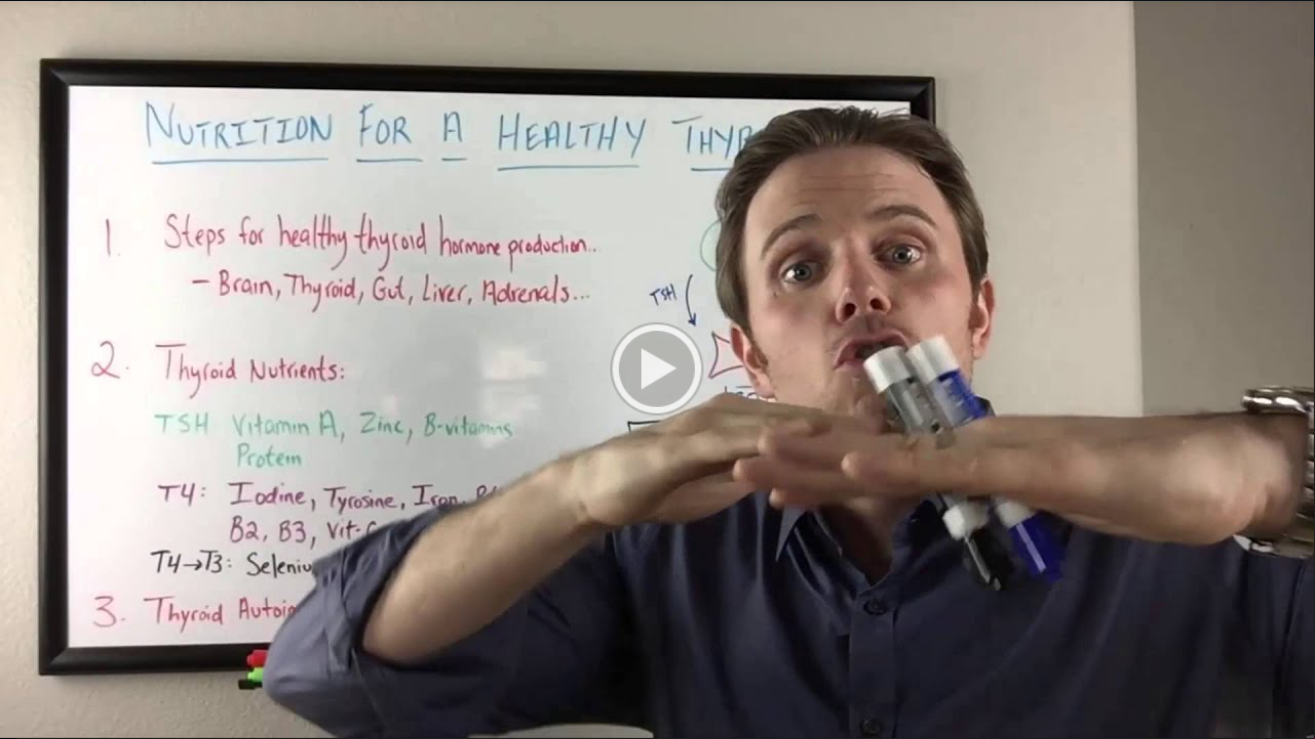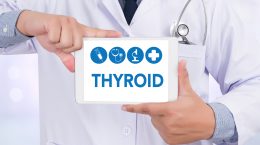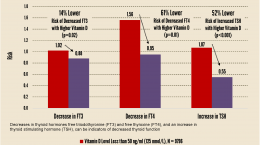Published on July 30, 2021
Video Friday: Learn about the production and balance of thyroid hormones and how specific nutrients play a role in optimal thyroid function
Certain nutrients, such as iodine, selenium, zinc, B-vitamins, vitamin D, vitamin A and amino acids, are needed for optimal thyroid health and function. Other body systems are important for thyroid health including the gut, adrenals and the brain, and if they aren’t working optimally the thyroid will be negatively impacted.
Learn more about these nutrients and body systems needed to maintain healthy thyroid function by watching today’s informational video by Dr. Justin Marchegiani.
Watch the Video
After watching the video, be sure to make note of our added details below!
Maintaining Healthy Thyroid Function
Here is a quick summary of what this video discusses, along with additional information and details from GrassrootsHealth:
- The thyroid is a gland that produces, stores, and releases thyroid hormones, which are important to the function of many systems and organs, including the heart, brain, liver, kidneys and skin. Thyroid hormones help regulate vital functions, such as breathing, heart rate, muscle strength, menstrual cycles, body temperature, metabolism, and more.
- Thyroid dysfunction is under-diagnosed with some population studies indicating that up to 10% of Americans may have thyroid dysfunction. Thyroid autoimmunity is often missed and should be ruled out.
Steps for Healthy Thyroid Hormone Production and the Nutrients Needed
1. The brain signals thyroid to make thyroid hormone by producing TSH (thyroid stimulating hormone)
- TSH increases when thyroid hormones are decreased (telling the thyroid to make more)
- TSH decreases when thyroid hormones are increased (telling the thyroid to make less)
- Nutrients needed include vitamin A, zinc, B vitamins, and protein
2. The thyroid makes the thyroid hormone T4
- T4 generation needs sufficient amounts of iodine, tyrosine, iron, B6, B2, B3, vitamin C, and vitamin D; Dr. Marchegiani suggests a vitamin D level between 70-100 ng/ml (175-250 nmol/L)
- Note: it is very important to get enough selenium when supplementing with iodine
3. T4 is converted to T3
- Approximately 20% of T4 is converted to T3 at the thyroid; the other 80% is converted peripherally with the majority at the liver and the rest in the gut and adrenals
- Gut health is important, especially since gut issues can impede absorption of the nutrients needed
- Conversion requires selenium and zinc, and needs healthy liver function (which can be hindered by high toxins, not enough antioxidants, and low selenium), as well as healthy gut function and bacteria
- Healthy cortisol levels are also needed to maintain healthy thyroid hormone levels. In fact, high stress can increase reverse T3, which is inactive and blocks the actions of T3.
A study by Mirhosseini it al. found that vitamin D supplementation to target a level of at least 40 ng/ml (100 nmol/L) resulted in a significant reduction of TSH and the detection of hypothyroidism and subclinical hypothyroidism. This study found a 30% reduced risk of hypothyroidism and a 32% reduced risk of elevated anti-thyroid antibodies among participants whose vitamin D level was 50 ng/ml (125 nmol/L) or higher.
Of note, vitamin B12 status was also significantly associated with low thyroid function, and improving vitamin B12 status was shown to significantly increase thyroid hormones FT3 and FT4.
What nutrients might you be missing that could be preventing optimal thyroid function?
Make Sure You Are Getting Enough Vitamin D and Other Important Nutrients – Measure Your TSH as Well!
 Having and maintaining healthy vitamin D levels and other nutrient levels can help improve your health now and for your future. Choose which to measure, such as your vitamin D, omega-3s, and essential minerals including magnesium and zinc, by creating your custom home test kit today. Take steps to improve the status of each of these measurements to benefit your overall health. You can also track your own intakes, symptoms and results to see what works best for YOU.
Having and maintaining healthy vitamin D levels and other nutrient levels can help improve your health now and for your future. Choose which to measure, such as your vitamin D, omega-3s, and essential minerals including magnesium and zinc, by creating your custom home test kit today. Take steps to improve the status of each of these measurements to benefit your overall health. You can also track your own intakes, symptoms and results to see what works best for YOU.
Enroll and test your levels today, learn what steps to take to improve your status of vitamin D (see below) and other nutrients and blood markers, and take action! By enrolling in the GrassrootsHealth projects, you are not only contributing valuable information to everyone, you are also gaining knowledge about how you could improve your own health through measuring and tracking your nutrient status, and educating yourself on how to improve it.






